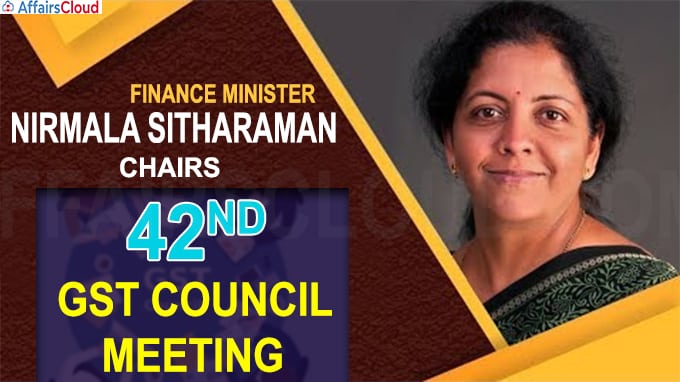
In the current fiscal (FY21), the states are facing Rs 2.35 lakh crore Goods and Services Tax (GST) revenue shortfall, out of which, Rs 97,000 crore is on account of GST shortfall, while Rs 1.38 lakh crore is due to COVID-19 pandemic.
In this regard, on October 5, 2020 the 42nd GST Council meeting was held video conferencing from New Delhi under the chairmanship of Union Finance Minister Nirmala Sitharaman where it was decided that this year’s compensation cess collected amounting to Rs 20,000 crore will be disbursed to the states.
- The meeting was attended by Minister of State (MoS) Anurag Singh Thakur, Ministry of Finance along with Finance Ministers and Senior officers of States and UTs (Union Territories).
Before heading towards the recommendations let’s have a brief on GST compensation cess.
Goods and Services Tax (Compensation to States) Act, 2017 was enacted to levy Compensation cess for providing compensation to the States for a period of five years due to the loss of revenue arising on account of implementation of GST i.e. with effect from July 1, 2017 (Provisions of the Central Goods and Services Tax Act-CGST is brought into force) till July 1, 2022.
Here are the key Recommendations by 42nd GST Council:
– Extension of compensation cess: The transition period of five years for levy of Compensation Cess will be extended i.e. beyond June, 2022.
– Integrated GST: An amount of about Rs 25,000 crore towards IGST of 2017-18 will be released by the end of next week to the states which had received less earlier.
- This decision has been taken on the recommendations of the committee under the chairpersonship of Bihar Deputy Chief Minister Sushil Modi.
- It should be noted that the states which got more amount will not be asked to return the extra amount immediately, but will have to do it eventually.
Relief in tax compliance for small taxpayers: With effect from January 1, 2021, small taxpayers with annual turnover less than Rs 5 crore will not be required to file monthly returns (GSTR-3B and GSTR-1). They will only file quarterly returns.
- Therefore, the number of returns of small taxpayers will be reduced from 24 to 8.
Refund Credit: With effect from January 1, 2021, Refund will be disbursed in a validated bank account linked with the PAN (Permanent Account Number) & Aadhaar of the registrant.
Exemption: To encourage domestic launching of satellites by young start-ups, the satellite launch services supplied by Indian Space Research Organisation (ISRO), Antrix Corporation Ltd. and NSIL (NewSpace India Limited), the GST of 18% will be exempted.
Borrowing amount for states increased to Rs 1.1 lakh crore: In the 41st GST Council meeting on August 27, 2020 the GST Council presented two options to states regarding GST compensation where first was to provide Rs 97,000 crores at a reasonable interest rate while the second option was borrowing of Rs 2.35 lakh crore to meet the full compensation in cess fund the deficit via Reserve Bank of India (RBI) Special window. Click Here to Read about 41st GST Council Meeting
- Now, instead of Rs 97,000 crore provided as the first borrowing option earlier, the amount now has been made Rs 1.1 lakh crore.
HSN Code Mandatory from April 1– Taxpayers with annual turnover more than 5 crore will have to provide Harmonized System Nomenclature(HSN) code up to 6 digits and small taxpayers will have to provide HSN code up to 4 digits from April 1.
GST compensation issue:
Ten states and Union Territories (UTs) including Kerala, West Bengal, Punjab, Chattisgarh, Delhi, Telangana and Tamil Nadu have refused to accept the two options. They want the Centre to borrow funds and allocate it to states.
- To solve this issue further discussion will take place on October 12, 2020.
Recent Related News:
i.On August 10, 2020, Nirmala Sitharaman inaugurated an information repository, in the form of an online dashboard, for all projects identified under the National Infrastructure Pipeline
(NIP) through video conferencing from New Delhi. The dashboard hosted on the India Investment Grid (IIG) website “www.indiainvestmentgrid.gov.in”.
ii.HSBC India becomes 1st Foreign Bank in India to launch a ‘Green Deposit Programme’ exclusively for corporate clients to finance green initiatives and eco-friendly projects like renewable energy, clean transportation, and pollution prevention among others, that promote transition to a low-carbon, climate resilient and sustainable economy.
About GST Council:
GST Council is an apex member committee to modify or to procure any law or regulation based on the context of GST in India. The council is headed by the union finance minister (Current- Nirmala Sitharaman) assisted by the finance minister of all the states of India.
- It was constituted on 15th September 2016 under Article 279A of the Constitution.